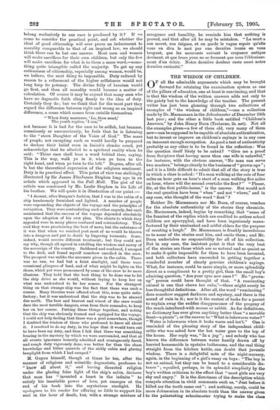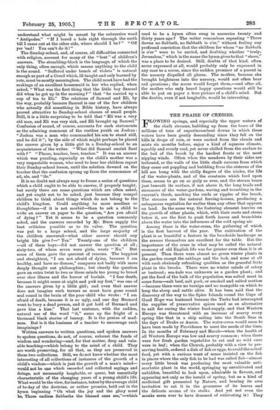THE WISDOM OF CHILDREN.
OF all the admirable arguments which may be brought forward for retaining the examination system as one of the pillars of education, one at least is convincing, and that is that the wisdom of the written answers adds not only to the gaiety but to the knowledge of the teacher. The present writer has just been glancing through two collections of examples of " the wisdom of children,"—one a collection made by Dr. Macnamara in the Schoolmaster of December 24th last year ; and the other a little book entitled " Children's Answers," by John Henry Burn (Treherne, 2s. net). Not all the examples given—a few of them old, very many of them new—can be supposed to be capable of absolute authentication, but to invent or improve on children's sayings is in any case an innocent enough occupation. As good a test of authenticity probably as any other is to be found in the reflection : Was the question itself likely to be asked P " Give me a proof from Scripture that having more than one wife is unlawful," for instance, with the obvious answer, "No man can serve two masters," belongs clearly to the business of " grown-ups "; and it is a little difficult to admit that all of the story is true in which a class is asked : " If a man walking at the rate of four miles an hour gets an hour's start of a man walking five miles an hour, where will the second overtake the first P " " Please, Sir, at the first public-house," is the answer. But would not the real question have been " when" and not " where," and in any case, who thought of the word " first " ?
Neither Dr. 'Macnamara nor Mr. Burn, of course, vouches for the absolute authenticity of the stories they chronicle. Dr. Macnamara, indeed, begins by remarking that "some of the funniest of the replies which are credited to artless school children are apocryphal, and have been ingeniously manu- factured by their unabashed and artful elders for the purpose of creating a laugh." Dr. Macnamara is frankly incredulous as to some of the stories sent him, and omits them ; and Mr. Burn undertakes no responsibility for all of his collection. But in any case, the insistent point is that the very best of the stories are those which are so natural and so quaint as to make it quite impossible for them to have been invented, and both collectors have succeeded in getting together a wonderful number of clearly genuine children's sayings. What, for instance, could be more simple, or more splendidly direct as a compliment to a pretty girl, than the small boy's admiring question, "Are your eyes new ones ? " No " grown- up" person could have thought of that. "A ruminating animal is one that chews her cubs,"—there might surely be less thoughtful definitions. After all, the word " ruminating " does somehow suggest darkness and mystery, and there is the sound of ruin in it; nor is it the easiest of tasks for a parent to explain away the sudden disappearance of the progeny of the much-interfered-with mouse or rabbit. As for definitions, no dictionary has ever given anything better than " a movable feast—a picnic"; or the answer to "What is lukewarm water?" " Water is lukewarm when it looks warm and isn't" One is reminded of the pleasing story of the independent child- critic who was asked how the hot water goes to the top of the house. Her reply was, "In a jug " ; and nobody who has known the difference between water hastily drawn off by hurried housemaids in upstairs bathrooms, and the real thing straight from the kitchen kettle, can doubt that juvenile wisdom. There is a delightful note of the night-nursery, again, in the beginning of a girl's essay on boys : " The boy is not an animal, but they can be heard to a considerable dis- tance " ; equalled, perhaps, in its splendid simplicity by the boy's written criticism to the effect that "most girls are very shy and angry." It is the directness of the description which compels attention in vivid comments such as, "Just before it killed me the tooth came out "; and nothing, surely, could be more Johnsonian in its absolute truth than the answer given to. the painstaking schoolmaster trying to make the class
understand what might he meant by the subversive word " Antipodes." " If I bored a hole right through the earth till I came out at the other side, where should I be P" " Off per 'ead ! You can't do it I " The Sunday-school, and, of course, all difficulties connected with religion, account for many of the " best " of children's answers. The stumbling-block is the language, of which the only thing, often enough, which means anything to the child is the sound. " Suffered under bunch of violets " is natural enough as part of a Creed which, ill-taught and only learned by rote, must be mostly meaningless. The child must have had the makings of an excellent housemaid in her who replied, when asked, " What was the first thing that the little boy Samuel did when he got up in the morning P " that "he carried up a cup of tea to Eli." The relations of Samuel and Eli, by the way, probably because Samuel is one of the few children who actually did something in Bible history, have always proved attractive to Sunday-school classes of small people. Still, it is a little surprising to be told that " Eli was a very old man, and Eli was very sick, and Eli brought up Samuel." Confusion of sound, of course, accounts for such statements as the admiring comment of the restless youth on Joshua : "Joshua was a man who commanded his son to stand still, and he did it "; by the side of which might perhaps be placed the answer given by a little girl in a Sunday-school to an acquaintance of the writer. " What did Samuel anoint Saul with ? " " Please, teacher, beer, teacher." It was an answer which was puzzling, especially as the child's mother was a very respectable woman, who used to hear her children repeat their Sunday-school lesson, until the solution dawned on the teacher that the confusion sprang up from the consonance of oil, ale, and " ile."
It is no doubt not always easy to frame a series of questions which a child ought to be able to answer, if properly taught, but surely there are some questions which are often asked, and yet ought not to be asked, just because they compel children to think about things which do not belong to the child's kingdom. Could anything be more needless or thoughtless—if it is not morbid—than to ask a child to write an answer on paper to the question, "Are you afraid of dying P " Yet it seems to be a question commonly asked, and the answers recorded by Mr. Burn supply the best criticism possible as to its value. The question was put to a large school, and the large majority of the children answered—what other answer should any bright life give ?—" Yes." Twenty-one of the children —all of them boys—did not answer the question at all ; sixty-two, of whom seven were girls, wrote " No." But some of them gave the queerest of reasons. The happiest and straightest, "I am not afraid of dying, because I am healthy, and have no disease," compares not badly with more deeply thought out philosophies ; but clearly the question gave an extra twist to two or three minds too young to brood over slow illness and the horror of burials. " I fear death, because it might come at night and pull my feet," was one of the answers given by a little girl; and even that answer does not imagine such terrors as must have gone round and round in the brain of the poor child who wrote : " I am afraid of death, because it is so ugly, and one day Bernard went to bury a dead person, and it got hold of Bernard and gave him a kiss." That last sentence, with the sudden, natural use of the word " it," sums up the fright of a thousand black stories of lunacy. It is the genius of mad- ness. But is it the business of a teacher to encourage such imaginings P Written answers to written questions, and spoken answers to spoken questions, do not, of course, exhaust the funds of wisdom and wondering—and, for that matter, deep and valu- able teaching—which belong to the mind of a child. They are worth preserving, for all that, as they are preserved in these two collections. Still, we do not know whether the most interesting of all collections of instances of the growth of a child's wisdom—which is just the growth of a man's mind— would not be one which recorded and collected sayings and doings, not necessarily laughable, or queer, but essentially characteristic of the changing years of a young child's life. What would be the view, for instance, taken by the average child of to-day of the doctrine, or rather promise, held out in the hymn beginning " Oh what the joy and the glory must be Those endless Sabbaths the blessed ones see,"—which used to be a hymn often sung in nurseries twenty and thirty years ago ? The writer remembers repeating " There dawns no Sabbath, no Sabbath is o'er," without feeling any profound conviction that the children for whom " no Sabbath is o'er" were to be envied, and doubting whether " truly- Jerusalem," which is the name the hymn gives to that " shore," was a place to be desired. Still, doubts of that kind, often never expressed at all, would probably only be expressed in any case to a nurse, since the sudden presence of a parent in the nursery dispelled all gloom. The mother, because she brought brightness into the nursery, would not often hear sad questions ; the nurse would forget them,—and after all, the mother who only heard happy questions would still be able to put on paper a true picture of a child's mind. But the doubts, even if not laughable, would be interesting.







































 Previous page
Previous page